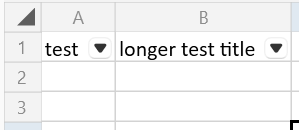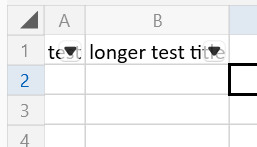Parsing a document that contains a cell with wrapped multiline text and its row doesn't define a value for height, results in wrong row height when rendering or exporting to PDF.
Workaround: Fit the height of the row when it contains wrapped cells:
Worksheet worksheet = workbook.ActiveWorksheet;
CellRange wrappedCells = worksheet.GetUsedCellRange(CellPropertyDefinitions.IsWrappedProperty);
for (int i = wrappedCells.FromIndex.RowIndex; i < wrappedCells.ToIndex.RowIndex; i++)
{
worksheet.Rows[i].AutoFitHeight();
}
SpreadProcessing: InvalidOperationException when opening an XLS document with a named range that refers to a formula. The message is "Only applicable to named ranges". Opened correctly in Excel.
When autofit is applied on a button with a filter, the button width is not taken into account and it overlaps the text.
Expected:
Actual:
When a file uses shared formulas, if the cell references are not explicitly written in the cell element, the formulas will not be shown correctly. This will manifest like a file that has a succession of slightly differing formulas in Excel and in RadSpreadsheet or RadSpreadProcessing they will be a succession of the same formula instead.
Provide the following options for the image:
- Move and size with cells
- Move but don't size with the cells
- Don't move or size with the cells
LayoutHelper is not calculating Height properly in net standard.
Workaround: use SpreadFixedTextMeasurer
When a worksheet contains a cell with longer text, which is right aligned and this text happens to be in the last column of the page, the worksheet is incorrectly split into pages and the last column gets transferred on the next page.
Workaround: Set explicitly the print area you would like to print.
worksheet.WorksheetPageSetup.PrintArea.SetPrintArea(new CellRange(0, 0, 38, 14));
The Value property of DefinedName (implementing ISpreadsheetName) always returns a result with a General format, which is very impractical when the value is for example a date. There should be an option to get a formatted result as well.
A possible workaround for this missing functionality would be to parse the RefersTo value and find where it points in order to grab the format:
Workbook workbook = new Workbook();
Worksheet ws = workbook.Worksheets.Add();
ws.Cells[0, 1].SetValue("2/1/2013");
ws.Names.Add("MyField", "=Sheet1!$B$1", new CellIndex(0, 0), "My Field");
string value = ws.Names["MyField"].Value;
CellRange range;
bool success = NameConverter.TryConvertCellRangeNameToCellRange(ws.Names["MyField"].RefersTo, out range);
CellValueFormat format = ws.Cells[range].GetFormat().Value;
string result = ws.Cells[range].GetValue().Value.GetResultValueAsString(format);
Applying text format to a column also sets the format to the next column.
This happens when the columns have a size different from the default and two consecutive columns with different format also have the same size. This can be worked around with a slight change in the column sizes:
int columnCount = worksheet.UsedCellRange.ColumnCount;
for(int i = 1; i < columnCount; i++)
{
ColumnWidth colWidth = worksheet.Columns[i].GetWidth().Value;
if(colWidth.Value != SpreadsheetDefaultValues.DefaultColumnWidth)
{
ColumnWidth previousColWidth = worksheet.Columns[i - 1].GetWidth().Value;
if(colWidth.Equals(previousColWidth))
{
worksheet.Columns[i].SetWidth(new ColumnWidth(colWidth.Value + 1, colWidth.IsCustom));
}
}
}


